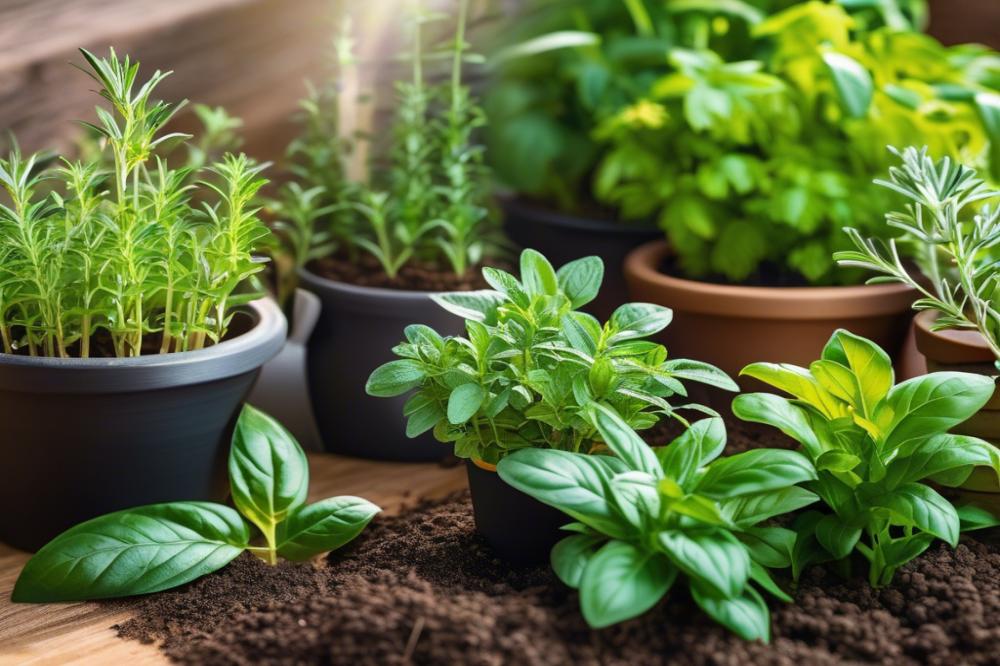Introduction
Herb gardening has become a popular pastime for many. Growing your own herbs can transform meals into culinary masterpieces. Fresh herbs add flavor and aroma that dried options simply cannot match. Furthermore, they provide a sense of satisfaction for the gardener. Watching plants flourish can be a rewarding experience.
Choosing the correct soil mix is essential for a successful herb garden. The soil acts as the foundation for your plants, impacting their overall health. A proper herb garden soil mix contains vital components that support robust growth. It supplies necessary nutrients and promotes a thriving ecosystem. Factors like pH balance, organic matter, and drainage capabilities are crucial. Without the right mix, your herbs may suffer from stunted growth or diseases.
When selecting soil for herbs, you might consider potting mix enriched with compost. This combination boosts nutrient levels and improves soil structure. Ingredients such as vermiculite and perlite enhance aeration and drainage. Good drainage allows excess water to escape, preventing root rot. It’s important to balance these elements to create an ideal growing environment for your herbs.
Whether you’re aiming for container gardening or planting directly into garden soil, the right mix will support your plants. A healthy herb garden soil mix can lead to lush, aromatic herbs that elevate your cooking. Ultimately, investing time into preparing the right soil can yield bountiful results.
Understanding Herb Garden Soil Mix
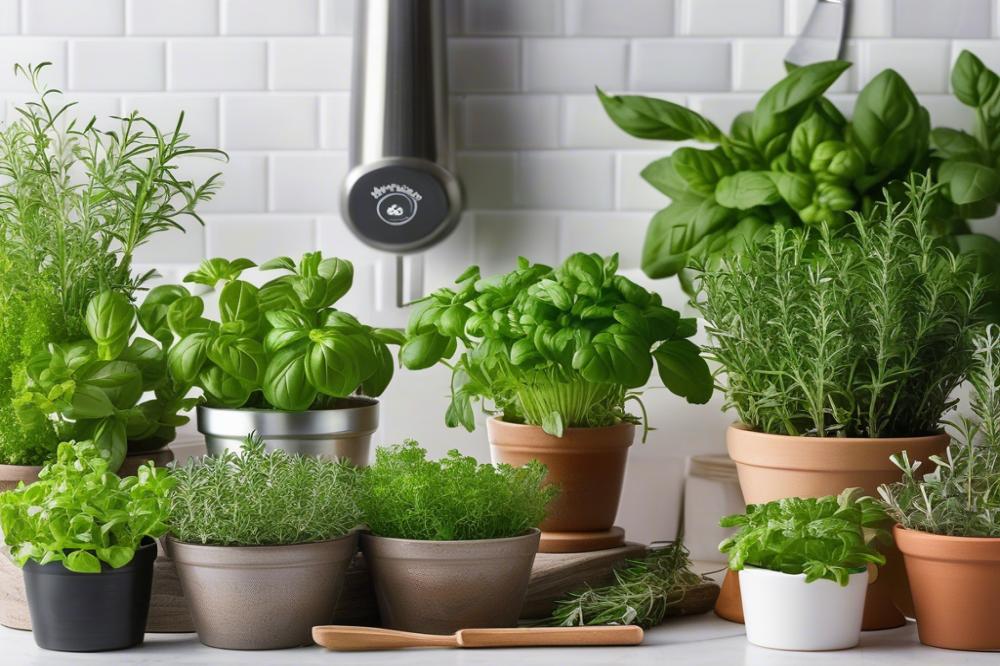

Creating a thriving herb garden starts with understanding the right soil mix. A suitable mix serves as the foundation for healthy growth. At its core, this mix typically includes potting mix, compost, and garden soil. Each component plays an essential role in supporting herb plants.
Potting mix is often the first choice for container gardening. It has a light texture, allowing roots to breathe and facilitating proper drainage. Vermiculite and perlite are common ingredients in potting mixes. Both materials help retain moisture while promoting airflow. This is important because herbs thrive in well-aerated soil.
Compost acts as a natural fertilizer. It enriches the soil with vital nutrients and beneficial microorganisms. Organic matter enhances soil structure and promotes healthy root systems. Compost also supports pH balance, helping to create an ideal environment for plant growth.
Garden soil contributes stability to the mix. It contains a variety of microorganisms that further enrich the mix. Well-aerated garden soil provides essential minerals and promotes drainage. This aspect is crucial since herbs generally dislike soggy roots.
Understanding the role of organic matter is vital for soil quality. Organic matter improves water retention while enhancing nutrient availability. It creates a habitat for worms and beneficial bugs, which aerate the soil through their movements. These elements work together to foster a thriving herb garden.
Importance of Drainage
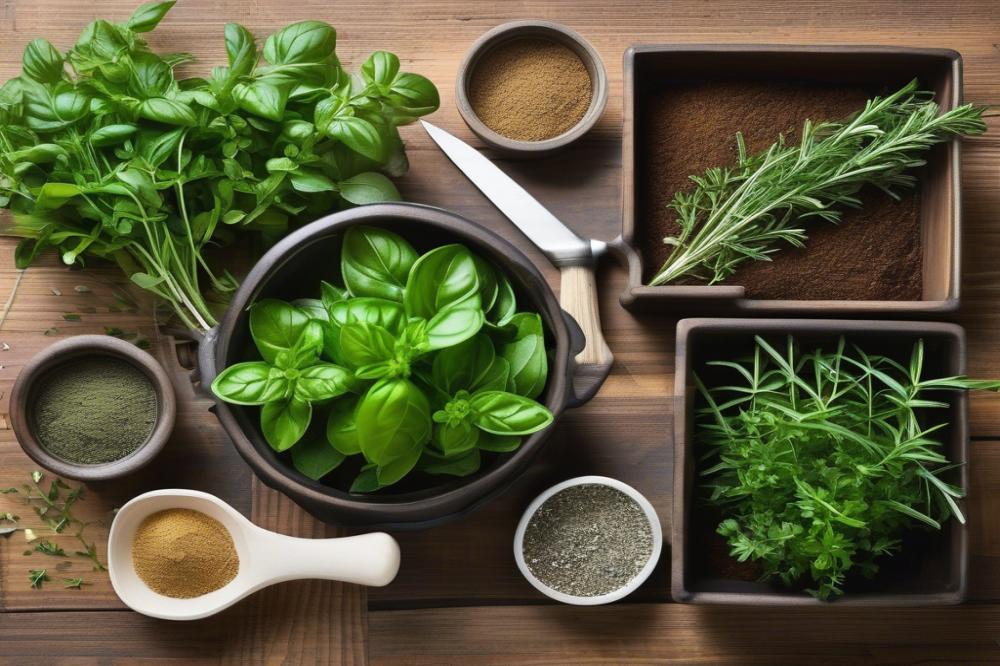

Understanding Drainage in Soil
Good drainage is essential for healthy herb growth. Soil that retains too much water can drown roots. This suffocation leads to root rot, which is often deadly for plants. A balanced soil mix allows excess water to escape, keeping roots dry enough to breathe. Many herb gardeners use potting mix combined with garden soil to achieve this balance. Organic matter mixed into the soil can help with drainage too. It supports both aeration and nutrient retention, two key factors for vibrant herbs.
How Drainage Affects Herb Growth
When herbs don’t have the right drainage, several problems can arise. Stagnant water encourages growth of mold and pests, which can harm healthy plants. Moreover, inadequate drainage can result in nutrient deficiencies. Nutrients may wash away too quickly, leaving your herbs starved. Herbs like basil and parsley thrive with well-drained soil that doesn’t hold onto excess moisture. They prefer a consistent moisture level instead of waterlogged conditions.
Incorporating Materials for Better Drainage
To improve drainage, many gardeners incorporate materials like vermiculite and perlite into their soil mix. Both options enhance aeration, making it easier for water to flow through the soil. Vermiculite retains some moisture, which can be helpful in hot weather, while perlite improves airflow. Mixing these materials into your potting mix or compost can create a perfect environment for herbs. The result is a light, fluffy texture that helps prevent compaction. Proper pH balance is also crucial for boosting nutrient absorption in herbs. Well-drained soil is key to achieving that delicate mix of moisture, air, and nutrients.
Nutrient Considerations
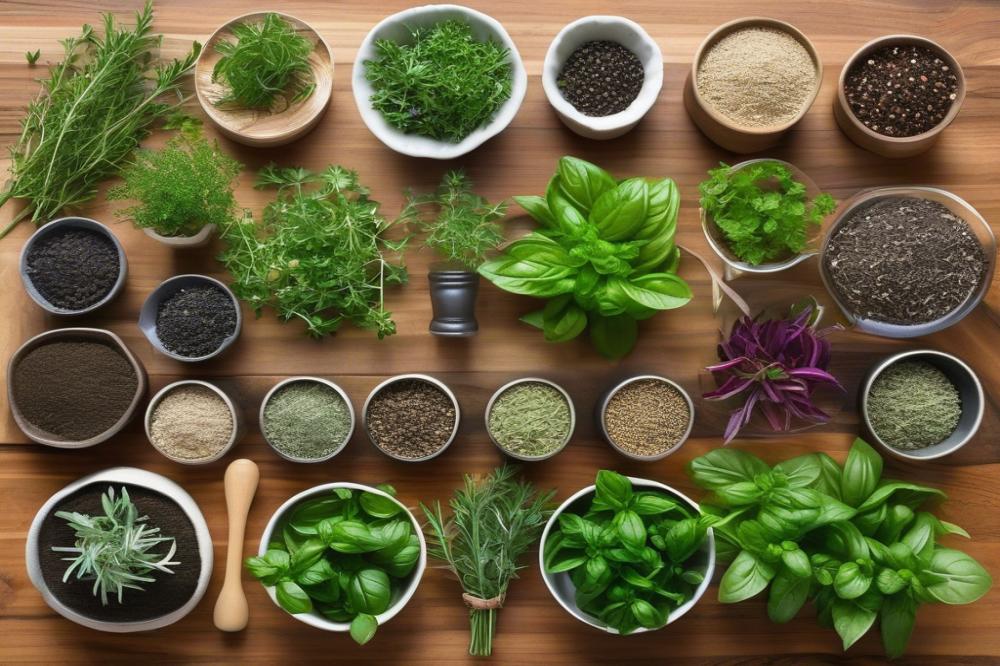

Essential nutrients for healthy herbs
Herbs thrive when they receive the right mix of nutrients. Key players in this process include nitrogen, phosphorus, and potassium. These elements help herbs grow strong and flavorful. In addition to these primary nutrients, various micronutrients also play roles in plant health. Iron and magnesium, for instance, support vital functions within the plants. Each herb may have unique needs. Understanding these requirements is important for any gardener.
Balancing nutrients with organic matter
Organic matter serves as the foundation of a healthy soil ecosystem. It can be derived from multiple sources, like compost and decomposing leaves. By adding rich organic material, you promote better nutrient retention. The balance of nutrients often affects a plant’s growth patterns. Too much of one nutrient can lead to issues like weak stems or burnt leaves. Adjusting this ratio requires careful observation and occasionally soil testing.
How compost contributes to nutrient availability
Compost is a powerhouse for gardening. By using kitchen scraps, yard waste, and plant debris, gardeners create a nutrient-dense additive. This mixture enhances the soil’s structure while boosting fertility. Nutrients released during decomposition become available to plants over time. Maintaining a proper pH balance in compost also ensures that nutrients are accessible. A combination of vermiculite and perlite can aid drainage as well. Both provide aeration, preventing root rot in container gardening. Mixing compost with garden soil can lead to a thriving herb garden soil mix. Overall, composting provides sustenance and fosters healthy growth.
pH Balance for Herbs
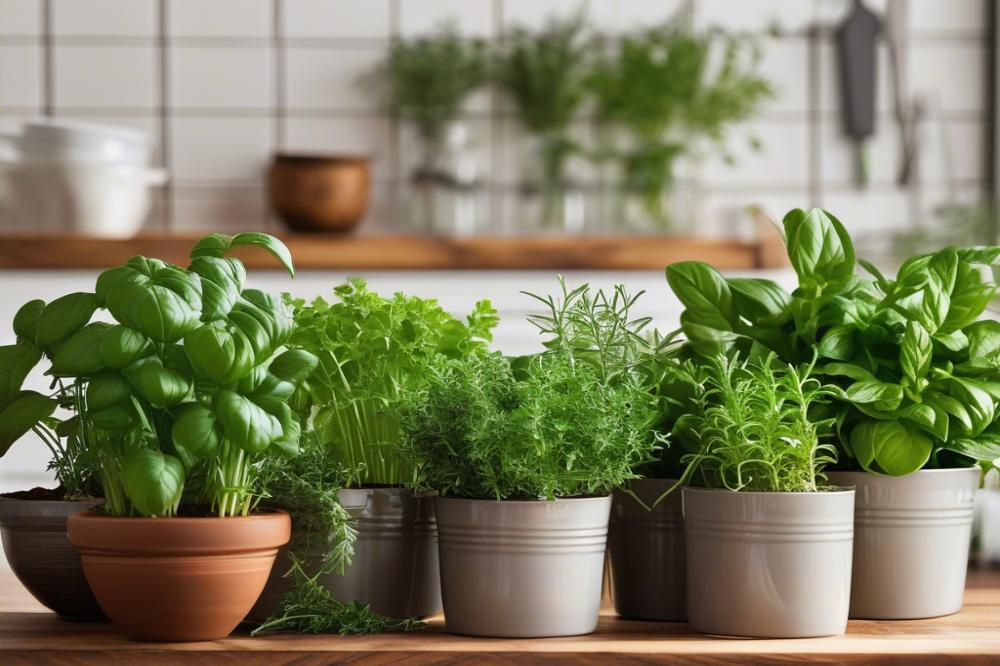

Understanding pH is essential for successful herb gardening. It refers to the acidity or alkalinity of the soil. This measurement impacts nutrient availability, influencing how well plants grow. Most herbs prefer a specific pH range to thrive. If the balance is off, it can lead to poor growth and unappealing flavors.
Ideal pH Range for Common Herbs
Most culinary herbs flourish in a pH range of 6.0 to 7.0. Basil, parsley, and cilantro are examples of herbs that thrive in slightly acidic to neutral conditions. Rosemary and lavender, however, prefer slightly more alkaline conditions. Knowing the pH preference for each type of herb can make a considerable difference in your garden. The flavor and oil content of herbs can be greatly influenced by soil pH.
Testing and Adjusting Soil pH Levels
Testing soil pH is straightforward. Kits are available at garden centers, or you can use a pH meter. Once you have a reading, you can take action if adjustments are necessary. To raise pH, adding lime to the mix can help. Conversely, if the pH is too high, sulfur can lower it. Incorporating organic matter, like compost, can also aid in balancing soil chemistry. For container gardening, use a good potting mix that includes perlite or vermiculite for improved drainage. Balancing pH not only supports growth but also enhances the overall health of your herb garden soil mix.
Container Gardening and Soil Mix
Adapting Soil Mix for Container Gardening
Growing herbs in containers requires a careful approach to soil mix. Unlike garden soil, which can be heavy and compact, a potting mix is much more suitable for growing herbs in pots. This specialized mix often contains ingredients like vermiculite and perlite, which improve aeration. Herbs thrive best when their roots have plenty of space to breathe. Additionally, using compost introduces organic matter, which enriches the soil with nutrients.
Differences Between In-Ground and Container Soil Mixes
In-ground soils often vary depending on the local conditions. They can be heavy and may retain too much water for herbs, which prefer well-drained environments. Container mixes are formulated to provide excellent drainage while holding enough moisture. One major difference is that containers restrict root growth, creating the need for lighter mixes that offer good drainage. A good potting mix will also help maintain a balanced pH. This balance is crucial for nutrient availability to the herbs.
Best Practices for Maintaining Soil Health in Containers
Container gardening requires regular attention to soil health. It’s essential to monitor the moisture level often. Overwatering can lead to root rot, while underwatering stresses plants. Adding compost periodically refreshes the nutrient content of the potting mix. When plants are harvested, the nutrients they absorb should be replaced to maintain soil fertility.
Regularly checking the pH balance is also important. A pH of around 6 to 7 is ideal for most herbs. If the soil becomes too acidic or alkaline, it can limit a plant’s growth. Mixing in some organic matter can help adjust the pH over time. Lastly, consider rotating different herbs from season to season. This practice helps prevent nutrient depletion in the soil and contributes to a flourishing herb garden.
Wrapping Up Your Herb Garden Soil Essentials
Understanding the right soil mix is crucial for a thriving herb garden. Healthy plants start with a good foundation. By combining elements like potting mix and compost, you create an environment where roots can flourish. A well-balanced medium supports drainage while retaining moisture. This balance is key to keeping your herbs vibrant and full of flavor.
Consider selecting a soil that mimics the natural habitats of the herbs you want to grow. Different herbs have varied needs; some prefer drier conditions while others thrive in moist settings. Always pay attention to the specific requirements of each herb. With the appropriate soil, herbs can grow strong and healthy without unnecessary stress.
If you notice your plants struggling, take time to assess your soil mix. A little experimentation can lead to breakthroughs. Don’t hesitate to try different ratios or add organic materials to enhance the mix. Each garden is unique, so adjustments may be necessary.
In summary, blending the right components ensures a nourishing environment for your herb garden. Gardening is a rewarding experience, and understanding your soil is a significant part of that journey. So, roll up your sleeves and enjoy growing your herbs! Your efforts will surely lead to a luscious harvest.

